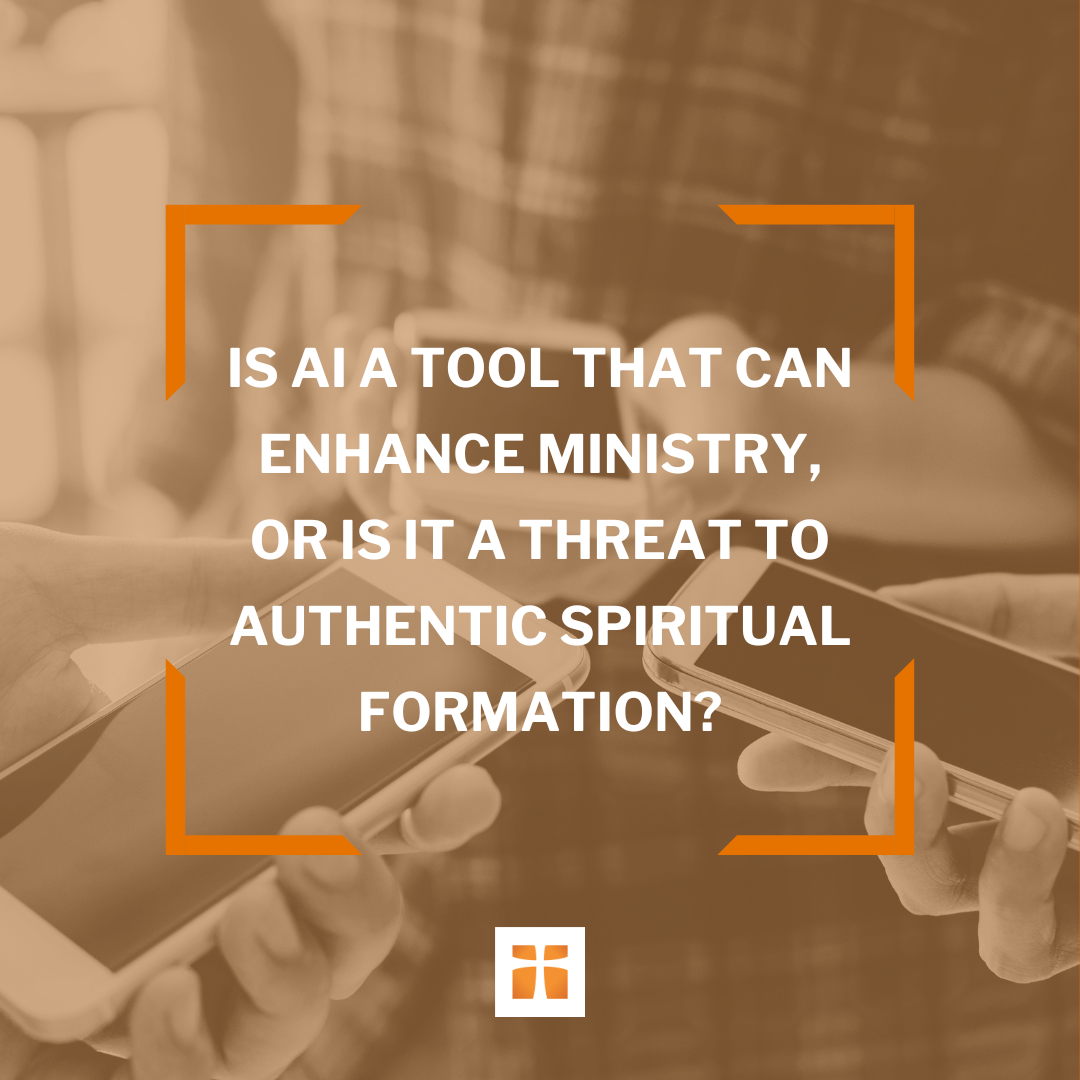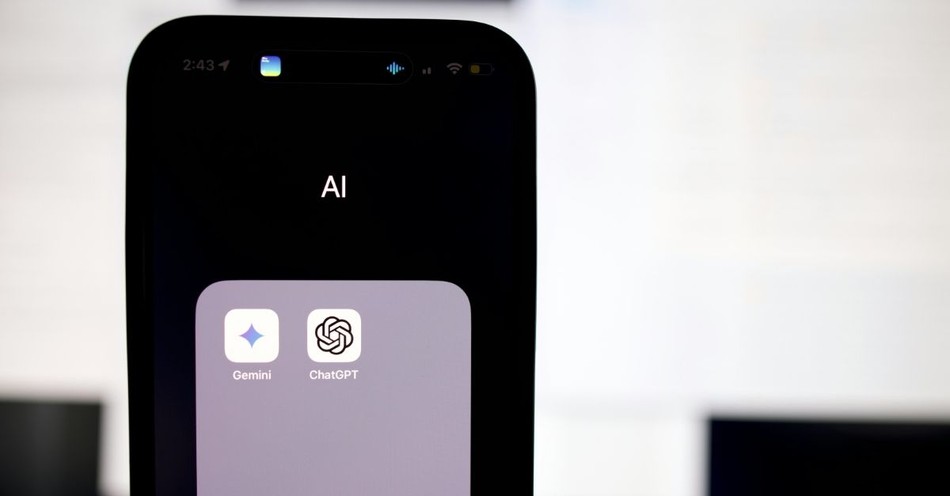Last month, I attended a conference where one speaker was celebrating the gift that AI is for the church, especially around global Bible translation. At the same conference, another pastor was lamenting the use of AI in the church, especially chatbots providing biblical answers to congregations. In both cases, the underlying question was the same: Is AI a tool that can enhance ministry, or is it a threat to authentic spiritual formation?
As someone who has spent decades in ministry and has watched technology reshape how we do church, I believe the answer is both more complicated and more hopeful than our initial fears might suggest. To be honest, I still don’t know if AI is inherently good or evil or neutral; I think there are good arguments for each, but what I do know is that AI is a powerful tool that will amplify whatever intentions we bring to it.
AI Is Already in the Church
Whether we're ready or not, AI is already in the church. Pastors are using it to brainstorm sermon ideas and write sermon reflection questions. Administrative staff are using it to draft communications. Church members are asking AI chatbots theological questions. The question isn't whether AI will affect the church—it's how we'll choose to engage with it.
I've spoken with pastors who are using AI to help them prepare for counseling sessions by processing research about trauma and healing. I've met preachers who use AI to help them write a funny joke or find a good anecdote that incorporates biblical themes in contemporary language. I know Christian educators who use AI to create study materials that meet their students where they are.
In each case, the technology itself wasn't the determining factor in whether the outcome was beneficial. The determining factor was the wisdom, intention, and theological grounding of the person using it.
How Can AI Potentially Benefit the Church?
When used thoughtfully, AI can be a powerful tool for ministry. It can help pastors research topics efficiently, allowing them to spend more time in prayer and pastoral care. It can assist in creating educational materials that are accessible to people with different learning styles. It can help churches communicate more effectively with their communities. It can even help a pastor organize their schedules to be able to meet with more people.
I'm personally excited about AI's potential to make biblical resources more accessible to people around the globe. Imagine an AI tool that can translate the Bible and biblical commentary into multiple languages instantly. These tools could bring the Word of God, in unprecedented ways, to those who might not have had access.
AI can also help with the administrative burden that often weighs down church staff, especially small church staffs like my own. From scheduling to communications to data management, AI can free up time for the relational and spiritual work that only humans can do.

What about Is AI Concerning to the Church?
There's the risk of replacing authentic human connection with digital interactions. There's the danger of prioritizing efficiency over depth, of choosing convenience over costly discipleship. There’s danger of not allowing the Spirit to lead, guide, direct a sermon, a conversation, a lecture. There’s concern about how leaders might use it for their own selfish gain and control.
I'm concerned about the potential for AI to create a form of spiritual fast food, to remove our creative instincts, as it provides quick answers to complex questions that require wisdom, time, discernment, experience, beauty, art, and lived experience to process. My son, a college student, refuses to use AI for that very reason. He says AI takes away our creativity and inspiration.
Also, when we think of the church and our faith, spiritual formation is inherently slow, relational, incarnational, and communal; it requires wrestling with questions, sitting with uncertainty, and learning from the experiences of others who have walked the path before us, and walking alongside those who are different than us. It requires the body of the Church to be on mission together. AI cannot offer that.
There's also the risk of AI perpetuating biases present in its training data. If an AI system has been trained primarily on the theological perspectives of one tradition or demographic, it might present those perspectives as universal truths. This could inadvertently marginalize voices that are already underrepresented in theological discourse.
Authenticity in an Age of AI
Perhaps the most significant concern is about authenticity. If a pastor uses AI to help write a sermon, is that sermon still authentically their own? If a counselor uses AI to help process information about a counselee's situation, does that compromise the personal nature of pastoral care?
These valid questions reveal our deeper questions about what makes ministry authentic. Is authenticity about doing everything from scratch, or is it about bringing our best selves to the work God has called us to? Is it about the process, or is it about the heart behind the process?
I wonder if authenticity in ministry isn't about avoiding all tools and resources—if it's about using them in ways that serve rather than replace the spiritual and relational work of ministry. Can a pastor who uses AI to help research a topic but then processes that information through prayer, theological reflection, and understanding of their congregation's needs still preach authentically? We need to wrestle, as a church, with these questions.
3 Best Practices for Wisely Moving Forward with AI
As we navigate this new landscape, I believe we need to approach AI with both openness and discernment. We need to be willing to explore its potential benefits while remaining vigilant about its potential dangers and downsides. Here are some principles that can guide us:
1. Remember that AI is a tool, not the Spirit of God.
It can help us process information and generate ideas, but it cannot replace the work of the Holy Spirit in spiritual formation. We must resist the temptation to treat AI as an authority on spiritual matters rather than as a resource to be evaluated through biblical and theological discernment. I heard someone use this phrase recently: “Always bring AI to the table.” I disagree. There are times to bring AI in, but if we are bringing anything to the table, “always,” it should be our inquiring of God, the Holy Spirit’s presence, and seasoned wisdom from our community.
2. Maintain the primacy of human relationships in ministry.
AI can supplement human connection, but it cannot replace it. The work of discipleship, counseling, long-suffering, and spiritual formation requires the kind of presence, empathy, and wisdom that only comes through relationship.
3. Be transparent about our use of AI.
If we're using AI tools in our ministry (as I did for this article), we should be honest about that and unashamed of it. This isn’t about confessing guilt—it's about modeling integrity and helping our communities understand how we're approaching these new tools.
How Does AI Present the Opportunity for Faithfulness?
The church has an opportunity to model faithful engagement with AI for the broader culture. Instead of either embracing it uncritically or rejecting it entirely, we can demonstrate what it looks like to evaluate new technologies through the lens of biblical wisdom.
This means asking questions like: How does this tool serve the mission of the church? Does it enhance or diminish human dignity? Does it promote justice and equity, or does it perpetuate existing inequalities? Does it help us love God and neighbor more effectively?
We can also contribute to the broader conversation about AI ethics by bringing theological perspectives to bear on these questions. The church has valuable insights about human nature, moral decision-making, and the purpose of technology that can inform how AI is developed and used. We have spiritual insight on how AI might be being used by Evil for gain. We can see discern this spiritually, in a way others may not see.
Ultimately, the question of whether AI is a tool or a threat to the church isn't one that can be answered universally. It depends on how we choose to engage with it. Like any powerful tool, AI will amplify our intentions and values. If we approach it with wisdom, prayer, and commitment to faithful ministry, it can serve the church well. If we approach it carelessly or with misguided priorities, it can cause harm.
I believe God is calling the church to be thoughtful, discerning, and faithful – innocent as doves and as shrewd as serpents—in how we engage with AI. How can we learn to use these tools in ways that serve the kingdom of God?
The Church Can Adapt Without Losing its Soul
In the midst of all this technological change, it's important to remember what doesn't change and who doesn’t change. The gospel doesn't change. The call to love God and neighbor doesn't change. The need for authentic community doesn't change. The importance of spiritual formation doesn't change. (And of course, God never changes.)
AI is a tool that can serve these unchanging purposes, but it can never replace them. Our relationship with God, our commitment to justice, our call to discipleship—these remain constant regardless of what new technologies emerge.
The church has weathered many technological revolutions before. We adapted to the printing press, to radio and television, to the internet and social media. In each case, we had to discern how to use new tools faithfully while maintaining our core identity and mission.
I believe the church at its best has always been adaptive without being compromised, innovative without being unfaithful, forward-thinking without losing sight of eternal truths. We have the theological resources, the spiritual wisdom, and the communal discernment to navigate this new landscape well.
4 Reflection Questions to Help You Examine How You Use Tech in Your Faith
1. How do you currently use technology in your spiritual life, and what values guide those choices?
Consider everything from Bible apps to online sermons to social media. What criteria do you use to determine whether a technology is enhancing or hindering your relationship with God and others?
2. What excites you most and concerns you most about AI's potential role in the church?
Be honest about both your hopes and fears. How might your church community benefit from thoughtful AI integration, and what safeguards would you want to see in place to protect what's most sacred about faith and community?
3. If your pastor told you they had used AI to help research or outline their sermon, how would you feel, and why?
Explore your gut reaction. Does it matter more to you that the content serves your spiritual growth, or that it was created entirely "from scratch"? What does this reveal about how you understand authenticity in ministry?
4. How can the church model faithful engagement with new technologies for the broader culture?
What unique perspectives does Christian faith bring to conversations about AI ethics, human dignity, and the common good? How might your church community contribute wisdom to these important discussions?
Photo Credit: ©Unsplash/ Solen Feyissa



.jpg)

